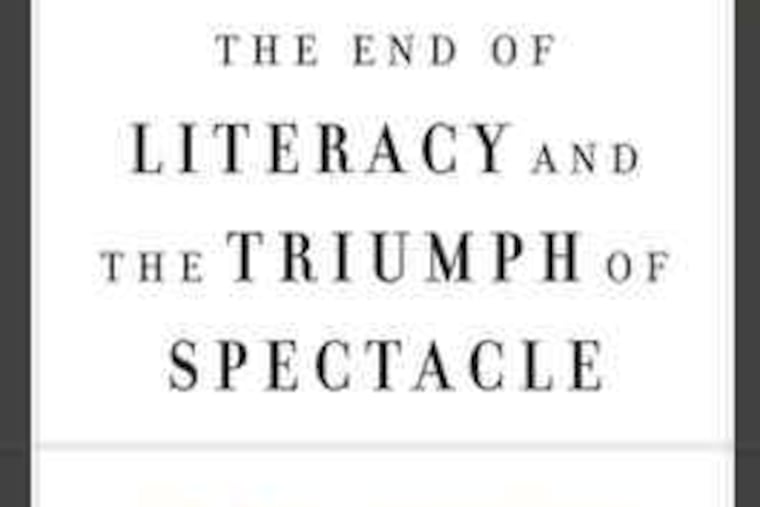On a dream deferred to capitalism
Real power in America doesn't reside in citizens, or the government, but in corporations. So argues Chris Hedges in his new book, Empire of Illusion: The End of Literacy and the Triumph of Spectacle (Nation Books).

Real power in America doesn't reside in citizens, or the government, but in corporations.
So argues Chris Hedges in his new book, Empire of Illusion: The End of Literacy and the Triumph of Spectacle (Nation Books).
Hardly a revelation.
Anticorporate jeremiads have become a dime a dozen in this, the year of our economic discontent.
Hedges is no garden-variety prophet. The Pulitzer Prize-winning former New York Times foreign correspondent, who will read at 7:30 tonight at the Free Library of Philadelphia, has written a trenchantly argued critique of the near-destruction of the American dream by unfettered capitalism.
Hedges, whose previous books include American Fascists: The Christian Right and the War on America and War Is a Force That Gives Us Meaning, not only shows how corporations wield power, he also examines how they manipulate and reshape the individual's sense of self.
Speaking by phone from his home in Princeton, Hedges says consumerist ideology has blinded Americans to reality.
"Our manufacturing base has been destroyed. Tens of millions of Americans live in real or near poverty. Our infrastructure is collapsing," he says. "We have massive deficits that we can never repay. . . . And we have a permanent war economy" that eats up "half our discretionary spending."
How do we react to all this? We shop, watch TV, shop some more, watch a bit more TV.
And, for the most part, we love it.
We are the 30 million deliriously upbeat Americans glued to the set each week for American Idol. (And we dream that someday, we, too, will be international stars.) We are the millions who devour magazines and TV specials that make us think we have intimate relationships with Cameron Diaz, or Robert Pattinson, or (heaven forbid!) Amy Winehouse.
We think we are happy, Hedges argues, because we think consumer culture - and the corporate power that underlies it - empowers us. In reality, it robs us of our moral autonomy.
Hedges says that our consumer conditioning has reduced "the values of thrift, a sense of community and self-sacrifice" to "a need for self-gratification." Democracy is reduced to the same level as "consumer choice or voting on American Idol."
The discrepancy between perception and reality, Hedges argues, has generated a culture of illusions that allow citizens to hide from reality. Infantilized by advertising, the media, and celebrity culture, we have become incapable of recognizing - much less fixing - the degradation of our social, political, and economic system.
"We are the most illusioned society on the face of the earth," Hedges said. "Oprah, the Christian right, self-help gurus, Hollywood tell us that we can have everything we want. And it's an illusion."
In reality, Hedges writes in his book, we have become "virtually disempowered" by corporate America. As employees, we are little more than disposable commodities, and as consumers we are addicted to goods we don't need.
Hedges argues that consumerism and celebrity culture have a powerful political function. "The whole fantasy of celebrity culture is not designed simply to entertain," Hedges says, but to make us politically passive.
Hedges says the move from "managed capitalism" to "unfettered capitalism" over the last four to six decades - accomplished with the help of government deregulation - has refashioned America as a "corporate state run by and on behalf of corporations rather than citizens." When corporate needs trump those of citizens, Hedges said, the poor and the weak don't stand a chance.
The net result of corporate power, Hedges writes in Empire, is that human beings are remade in the corporate image. In a brilliant analysis, Hedges shows how the reality show Survivor celebrates character traits we usually associate with the mentally ill.
Hedges quotes contestants who claim they have formed lifelong friendships during the show. Within minutes, the same best friends viciously turn on each other.
"The cult of self dominates our cultural landscape [and] . . . has the classic traits of psychopaths: superficial charm, grandiosity, and self-importance; a need for constant stimulations, a penchant for lying, deception, and manipulation; and the inability to feel remorse or guilt."
As Hedges tells the reader, these are the character traits valued in corporate leaders.
These leaders are "willing to consume human beings and destroy the ecosystem for the higher good of corporate profit," Hedges said.
He asserts that one of our greatest illusions is that reform is possible without questioning the system itself.
"The structure we have inherited of unfettered capitalism and globalization is accepted as natural law . . . as inevitable," he says. Question its moral or social effects, and the typical response is: "What are you going to do? This is the way things are." But must they be that way? Hedges asks. Economic systems were made by humans and can be remade.
Hedges says there is a great irony - and hypocrisy - at the heart of the current efforts to bail out failed companies.
"What is so mendacious and pernicious about this is that until these institutions collapsed, all they talked about is the market and unfettered capitalism. And when, because of their own folly, greed, and mismanagement, it collapsed, they are raiding the Treasury.
"We've become a socialist nation - but socialism for corporations."